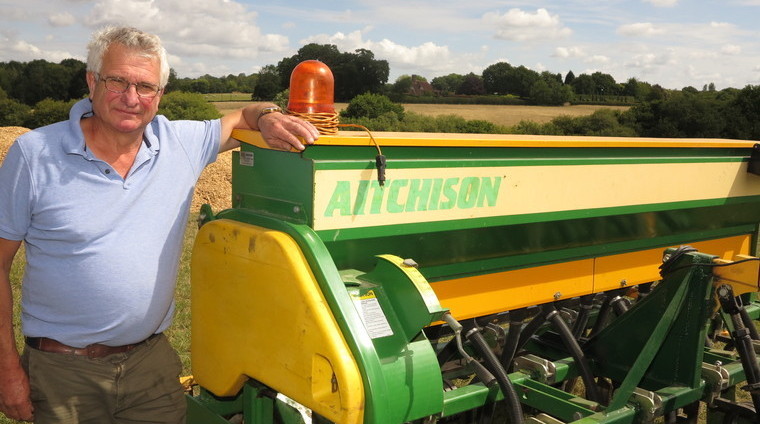Every pass of a field not only costs time and money but disturbs the soil, allows moisture to escape and increases the amount of carbon dioxide released into the atmosphere.
While minimal tillage reduces those impacts, direct drilling takes the process one step further, allowing the crop to be ‘stitched’ into the previous crop in one pass, either to improve an existing ley or sow something new.
It was the environmental and cost benefits of direct drilling that attracted Charlie Burchell to the process when he was looking for a niche service to offer farmers in the South East. A former dairy farmer, Charlie, who trades as Town Place Farm Direct Drilling Services, was looking for something that would not compete directly with larger contractors but would offer a specific benefit.
“The world of farming is changing and will continue to change. Anything that reduces soil disturbance, prevents the loss of CO2 and keeps moisture in the soil is likely to be increasingly important in future, and direct drilling presses all those buttons,” he explained.
“It is certainly not the answer to everyone’s needs, but as farming responds to environmental and cost challenges, I am certain it will increasingly prove its value as an efficient and effective way of establishing most crops.”
That establishment is boosted by the fact that Charlie, based at Town Place Farm, Uckfield, in East Sussex, uses a Simtech Aitchison direct drill which has a unique inverted T-boot system to place the seed in a pocket in the soil created either side of each coulter.
“The seed sits at just the right depth in an undisturbed micro-climate that retains its moisture because it is to either side of the drill,” said Charlie. “This gives the seeds a better start than being wedged in the compacted V-groove that is created by a disc drill.”
The decision to invest in the Simtech drill followed a great deal of research and reflects Charlie’s former dairy farming experience. “The Aitchison drill originated in New Zealand, where they know more than most people about growing grass, so it had the pedigree I wanted,” he said.
He wasn’t disappointed. The drill is well built, versatile, simple to operate and adjust and, in Charlie’s words, “does exactly what it says on the tin”. As well as the 18 inverted T-boots that place the seed in moist, undisturbed soil, Charlie is impressed by the sponge-fed metering system that dispenses seed in a continuous flow.
This unique system allows clovers, grasses and brassicas to be sown at very low rates, if desired, while cereals, peas and beans can be sown at up to 400kgs/hectare.
Charlie can also drill complex combinations such as conservation and wild bird mixes, arable silage, game and cover crops, with fine seed rate adjustment controlled by a simple wheel on the variable speed gearbox.
Since taking delivery of the Aitchison GrassFarmer last May, Charlie has direct drilled 400 acres for a variety of famers. “In some cases I have improved a ley to give it another year of use, but I have also drilled sunflowers, cover crops for shoots and wild bird mixes for environmental management schemes,” he commented.
“One of the beauties of direct drilling is that you can place the seeds into an area where there is moisture already. Even where moisture is lacking, the fact that you are moving less soil keeps further loss to a minimum when compared with conventional tillage.
“There will always be factors that are beyond your control, regardless of the methods used, such as extreme weather patterns, slugs, flea beetle and leather-jackets, but by providing a favourable environment for germination and establishment, you are maximising the chance that the crop will be able to grow away from such threats.”
From an environmental and cost benefit perspective, the Aitchison drill is very economical to run. Charlie relies on a Massey Ferguson 5610, a three cylinder, 103 HP machine supplied by Yeowarts that makes light work of towing the drill.
“On an average day and given good sowing conditions, I can drill more than 25 acres at a drilling speed of 4.6 mph on just under a tank of fuel,” he said. “The efficiency helps to cut costs that are already reduced by the fact that this is a single-pass system. Farmers increasingly have to look at environmental and financial costs, and direct drilling scores on both those issues.”
Charlie is now planning to add a front linkage so that he can mount a roller to compact the ground ahead of the drill and flatten any surface vegetation in the optimum direction for sowing.
He explained: “Since George Simon and his wife Lindsey began importing the Aitchison drill, George and his colleague Simon Clarke have developed a range of models that are designed specifically for Europe and are more versatile and user-friendly.
“The new drills built by Simtech give a wide range of models to choose from and are well-designed pieces of kit. They are very robust, which enables them to tackle some pretty unforgiving terrain with low running costs. The other benefit of going for Simtech is that George has provided absolutely first class backup and support.”
Charlie is so impressed that he is already thinking of upgrading to take advantage of recent improvements that make the drill easier to adjust and set up while retaining the build quality for which it is renowned.
“Direct drilling is definitely a valuable tool that farmers need to consider,” Charlie concluded. “It has a number of significant cost, environmental and establishment benefits and I am convinced that it will become increasingly important in the future.”




